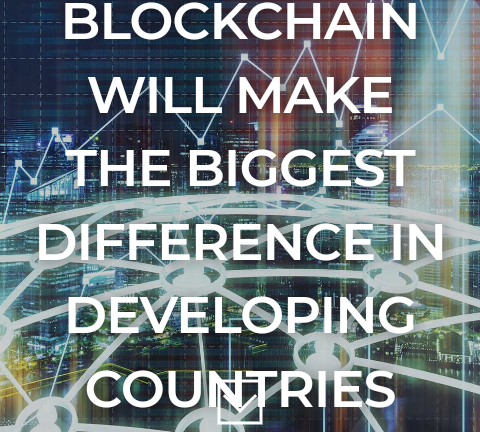
 Even though blockchain technology continues to make strides in developed countries, investment bank Exotix believes that it will have the biggest effect in emerging countries.
Even though blockchain technology continues to make strides in developed countries, investment bank Exotix believes that it will have the biggest effect in emerging countries.
In most cases, events develop in a step-by-step process. However, in some cases, technology allows us to bypass certain steps to get us to the end goal even quicker.
Paul Domjan, who is the global head of research, analytics, and data at Exotix touched on how certain technologies have the ability to skip a few steps to present end users with a solution to their original problem, as well as a host of additional benefits.
According to Business Insider, Domjan discussed how the rapid increase in smartphone usage showcases this. Having a fixed telephone line in a developed country is probably a given, but this isn’t the case in emerging countries. Instead of giving citizens in the latter the chance to experience the convenience of a landline, smartphones have instead given them the chance to experience the world from the comfort of their own palm, essentially skipping the step of having a fixed line.
$11880 $1235 $819
BLOCKCHAIN WILL MAKE THE BIGGEST DIFFERENCE IN DEVELOPING COUNTRIES
NIKITA BLOWS · JANUARY 28, 2018 · 3:00 PM
ALTCOINSBLOCKCHAIN TECHNOLOGYEMERGING MARKETSETHEREUMNEWSNEWS TEASER
Even though blockchain technology continues to make strides in developed countries, investment bank Exotix believes that it will have the biggest effect in emerging countries.
In most cases, events develop in a step-by-step process. However, in some cases, technology allows us to bypass certain steps to get us to the end goal even quicker.
Paul Domjan, who is the global head of research, analytics, and data at Exotix touched on how certain technologies have the ability to skip a few steps to present end users with a solution to their original problem, as well as a host of additional benefits.
According to Business Insider, Domjan discussed how the rapid increase in smartphone usage showcases this. Having a fixed telephone line in a developed country is probably a given, but this isn’t the case in emerging countries. Instead of giving citizens in the latter the chance to experience the convenience of a landline, smartphones have instead given them the chance to experience the world from the comfort of their own palm, essentially skipping the step of having a fixed line.
BLOCKCHAIN SKIPS THE QUEUE
Domjan feels blockchain may have a similar effect in countries with emerging economies. The specialist investment bank had this to say:
Today, frontier markets may be positioned to leapfrog developed economies once again, but this time the key technology is blockchain and cryptocurrencies.
Even though blockchain was originally created to support cryptocurrencies, it offers huge benefits to basically any industry relying on record keeping, especially in the financial sector.
WHERE THIS TECHNOLOGY COULD MAKE THE MOST DIFFERENCE
However, even though blockchain is a viable option for many businesses and groups, even the United Nations, it is by no means a blanket solution, especially if efficient processes are already in place. This is more evident in developed countries than in certain developing counterparts.
Domjan explained:
Due its distributed nature, recording new assets on a blockchain can be quite slow, with transaction times measured in hours or even days rather than the seconds that are typical of e-commerce. As such, blockchain technology is a poor substitute for existing ownership records in developed or even emerging economies.
However, some developing countries do not have any, or perhaps only have poor, structures or processes in place. In this case, blockchain technology could revolutionize certain sectors, specifically the property industry. Domjan elaborated:
Whereas some emerging markets, such as Russia and China, have property registration systems on par with those in the high-income OECD countries, frontier markets in Latin America, Sub-Saharan Africa, and South Asia lag far behind, with average performance less than half that of the best performing economies.
According to Domjan, the property sector is not the only one that can benefit from blockchain:
Indeed, blockchain technology can be used to maintain a clear, reliable record of anything. For example, Estonia has implemented the BitNation public notary services, including recognizing marriages recorded in the BitNation blockchain, and Ukraine is developing an election platform based on the blockchain.
Smart contracts also create an opportunity for developing countries to work more efficiently. These are automated contracts developed on the Ethereum blockchain, whereby, for example, payment is released to a certain party automatically once all of the pre-determined and agreed upon conditions are met. Even though it could work well in the case of a deed transfer, smart contracts can be used in other industries as well. Domjan explained:
The same principle can be used for transactions ranging from financial derivatives to international trade.
DON’T FORGET ABOUT DIGITAL CURRENCIES
Even though blockchain is so versatile, its original reason for existence can also be beneficial to these developing nations. Domjan believes that cryptocurrencies could provide a viable alternative to volatile fiat currencies in these countries:
In countries with capital controls, highly volatile currencies, and high inflation, the governance problems, payments transaction costs, and volatility of their domestic currency may seem worse than those of cryptocurrencies, or at least bad enough that cryptocurrencies represent an attractive hedge against their domestic currency. We see this advantage across the developing world, from foreign investors in Brazil looking to move money, to brokers in Zimbabwe looking for an alternative store of value.
Do you think that the blockchain adoption will grow in developing countries in 2018?
Hi! I am a robot. I just upvoted you! I found similar content that readers might be interested in:
https://bitcoinist.com/blockchain-will-make-biggest-difference-developing-countries/